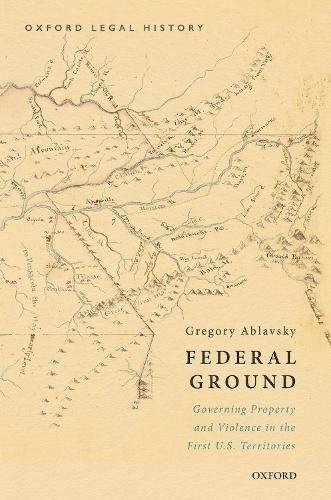Readings Newsletter
Become a Readings Member to make your shopping experience even easier.
Sign in or sign up for free!
You’re not far away from qualifying for FREE standard shipping within Australia
You’ve qualified for FREE standard shipping within Australia
The cart is loading…






Federal Ground depicts the haphazard and unplanned growth of federal authority in the Northwest and Southwest Territories, the first U.S. territories established under the new territorial system. The nation’s foundational documents, particularly the Constitution and the Northwest Ordinance, placed these territories under sole federal jurisdiction and established federal officials to govern them. But, for all their paper authority, these officials rarely controlled events or dictated outcomes. In practice, power in these contested borderlands rested with the regions’ pre-existing inhabitants-diverse Native peoples, French villagers, and Anglo-American settlers. These residents nonetheless turned to the new federal government to claim ownership, jurisdiction, protection, and federal money, seeking to obtain rights under federal law. Two areas of governance proved particularly central: contests over property, where plural sources of title created conflicting land claims, and struggles over the right to use violence, in which customary borderlands practice intersected with the federal government’s effort to establish a monopoly on force. Over time, as federal officials improvised ad hoc, largely extrajudicial methods to arbitrate residents’ claims, they slowly insinuated federal authority deeper into territorial life. This authority survived even after the former territories became Tennessee and Ohio: although these new states spoke a language of equal footing and autonomy, statehood actually offered former territorial citizens the most effective way yet to make claims on the federal government. The federal government, in short, still could not always prescribe the result in the territories, but it set the terms and language of debate-authority that became the foundation for later, more familiar and bureaucratic incarnations of federal power.
$9.00 standard shipping within Australia
FREE standard shipping within Australia for orders over $100.00
Express & International shipping calculated at checkout
Federal Ground depicts the haphazard and unplanned growth of federal authority in the Northwest and Southwest Territories, the first U.S. territories established under the new territorial system. The nation’s foundational documents, particularly the Constitution and the Northwest Ordinance, placed these territories under sole federal jurisdiction and established federal officials to govern them. But, for all their paper authority, these officials rarely controlled events or dictated outcomes. In practice, power in these contested borderlands rested with the regions’ pre-existing inhabitants-diverse Native peoples, French villagers, and Anglo-American settlers. These residents nonetheless turned to the new federal government to claim ownership, jurisdiction, protection, and federal money, seeking to obtain rights under federal law. Two areas of governance proved particularly central: contests over property, where plural sources of title created conflicting land claims, and struggles over the right to use violence, in which customary borderlands practice intersected with the federal government’s effort to establish a monopoly on force. Over time, as federal officials improvised ad hoc, largely extrajudicial methods to arbitrate residents’ claims, they slowly insinuated federal authority deeper into territorial life. This authority survived even after the former territories became Tennessee and Ohio: although these new states spoke a language of equal footing and autonomy, statehood actually offered former territorial citizens the most effective way yet to make claims on the federal government. The federal government, in short, still could not always prescribe the result in the territories, but it set the terms and language of debate-authority that became the foundation for later, more familiar and bureaucratic incarnations of federal power.